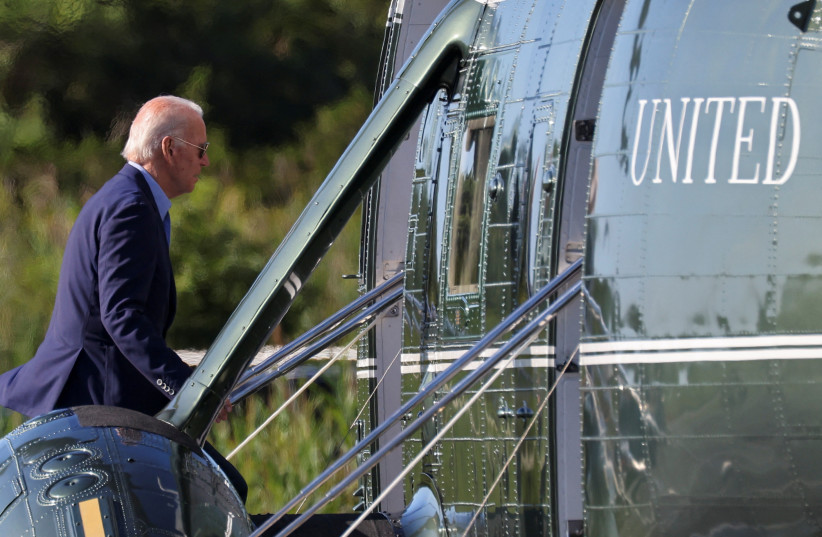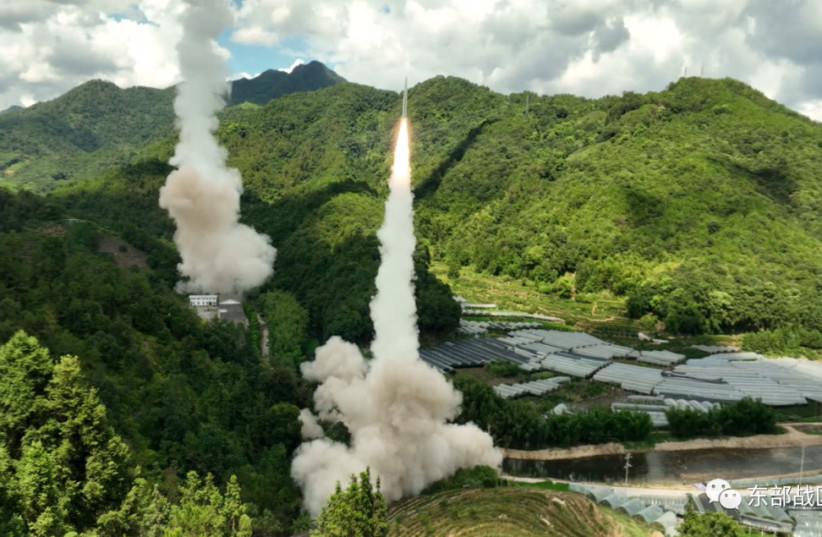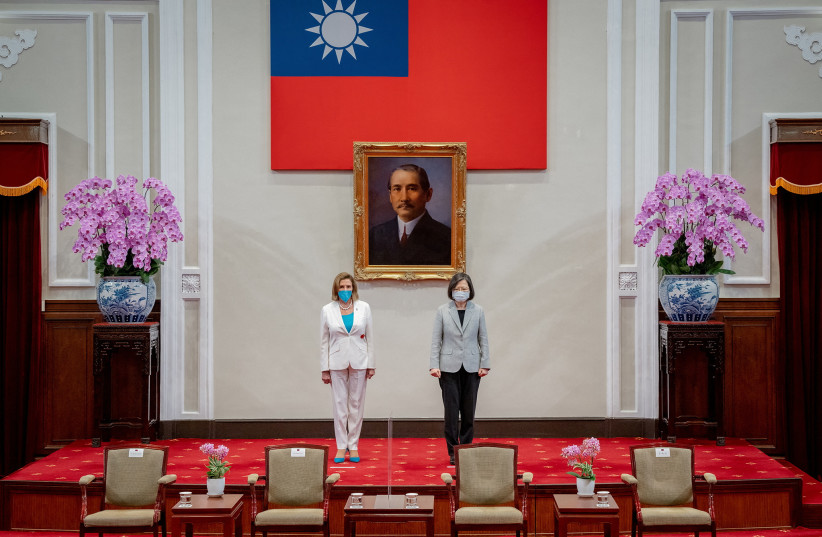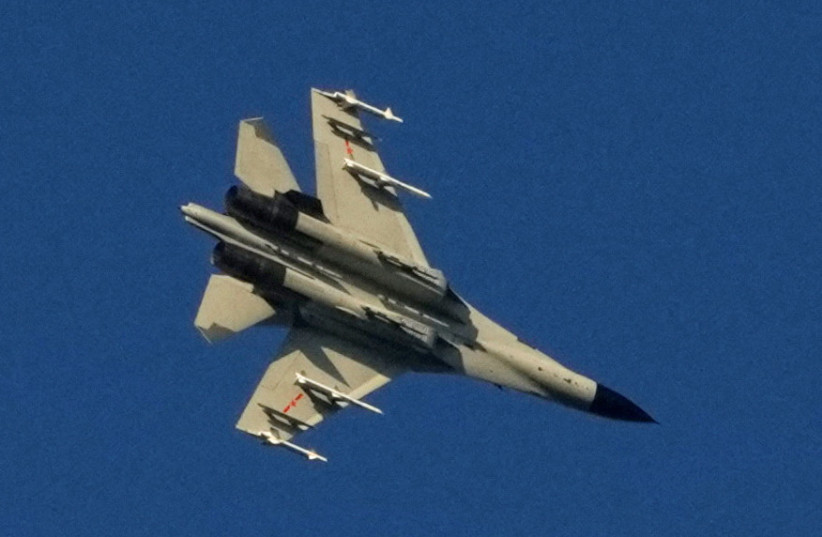China's military announced fresh military drills in the seas and airspace around Taiwan on Monday, a day after the scheduled end of its largest ever exercises to protest against last week's visit to the island by US House Speaker Nancy Pelosi.
China's Eastern Theatre Command said it would conduct joint drills focusing on anti-submarine and sea assault operations - confirming the fears of some security analysts and diplomats that Beijing would continue to maintain pressure on Taiwan's defenses.
Taiwan's foreign ministry condemned the move, saying China, which claims the self-ruled island as its own, was deliberately creating crises. It demanded Beijing stop its military actions and "pull back from the edge."
"In the face of military intimidation created by China, Taiwan will not be afraid nor back down, and will more firmly defend its sovereignty, national security, and free and democratic way of life," the ministry said in a statement.
US President Joe Biden, in his first public comments on Taiwan since Pelosi's visit, said he was not worried about Taiwan but was concerned about China's actions in the region.

"I'm concerned they are moving as much as they are," Biden told reporters in Delaware. "But I don't think they're going to do anything more than they are."
Pelosi's visit infuriated China, which responded with test launches of ballistic missiles over Taipei for the first time, as well as ditching some lines of dialog with Washington.
The duration and precise location of the latest drills is not yet known, but Taiwan has already eased flight restrictions near the six earlier Chinese exercise areas surrounding the island.

Taiwan's defense ministry later said it had detected 39 Chinese air force planes and 13 navy ships in and around the Taiwan Strait on Monday. Twenty-one Chinese air force planes had entered Taiwan's air defense zone, including fighter jets that crossed the median line in the northern part of the Taiwan Strait, the ministry said.
Singapore Prime Minister Lee Hsien Loong warned of the potential for miscalculation over tensions in the Taiwan Strait, which he said were unlikely to ease soon amid deep suspicion and limited engagement between the United States and China.
"Around us, a storm is gathering. US-China relations are worsening, with intractable issues, deep suspicions, and limited engagement"
Lee Hsien Loong, Singapore Prime Minister.
"Around us, a storm is gathering. US-China relations are worsening, with intractable issues, deep suspicions, and limited engagement," Lee said in a televised address on the eve of the city-state's national day.
"Deeply touched"
Shortly before the latest drills were announced, Taiwan President Tsai Ing-wen met visiting St. Vincent and the Grenadines Prime Minister Ralph Gonsalves, telling him she was moved by his determination to visit despite China's military pressure.
"Prime Minister Gonsalves has expressed in recent days that the Chinese military drills would not prevent him from visiting friends in Taiwan. These statements have deeply touched us," Tsai said at a welcome ceremony for Gonsalves in Taipei.

The Caribbean country is one of only around a dozen nations to have formal diplomatic ties with Taiwan and not China.
It was unclear if Tsai had invited Gonsalves before or after Pelosi's visit. "We don’t disclose internal planning or communications between governments," the Taiwanese foreign ministry said when asked by Reuters.
Beyond the firing of 11 short-range ballistic missiles during the four earlier days of exercises, Chinese warships, fighter jets and drones maneuvered extensively around the island.
Shortly before those drills ended on Sunday, about 10 warships each from China and Taiwan maneuvered at close quarters around the unofficial median line of the Taiwan Strait, according to a person familiar with the situation who is involved with security planning.
A Chinese state television commentator said late on Sunday that the Chinese military would now conduct "regular" drills on the Taiwan side of the line.
Military talks shelved
In Taipei, defense ministry spokesman Sun Li-fang told reporters that Taiwan’s armed forces had "calmly" handled the Chinese drills. Earlier, the ministry had said the drills had used warships, aircraft and drones to simulate attacks on the island and its navy.
China's designated no-fly zones, and crossings of the median line, have "compressed" Taiwan’s training space and will affect the normal operation of international flights and air routes in the future, the ministry said in a statement.
Chinese foreign ministry spokesman Wang Wenbin said on Monday that China was conducting normal military exercises "in our own waters" in an open, transparent and professional way, adding that Taiwan was part of China.

When asked whether China's ongoing drills abided by international law and whether new warnings for civilian air and sea traffic would be issued, Wang said relevant departments issued timely announcements in line with both domestic and international law.
China's defense ministry meanwhile maintained its diplomatic pressure on the United States, defending its shelving of military-to-military talks in protest at Pelosi's visit.
"The current tense situation in the Taiwan Strait is entirely provoked and created by the US side on its own initiative, and the US side must bear full responsibility and serious consequences for this"
Wu Qian, defense ministry spokesman.
"The current tense situation in the Taiwan Strait is entirely provoked and created by the US side on its own initiative, and the US side must bear full responsibility and serious consequences for this," defense ministry spokesman Wu Qian said in an online post.
"The bottom line cannot be broken, and communication requires sincerity," Wu said.
China called off formal talks involving theater-level commands, defense policy co-ordination and military maritime consultations on Friday as Pelosi left the region.
Pentagon, State Department and White House officials condemned the move, describing it as an irresponsible over-reaction.
